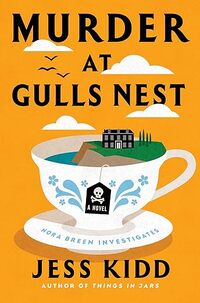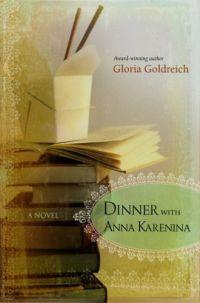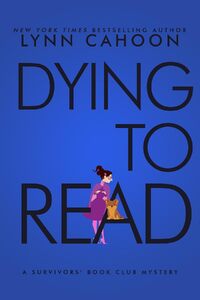 MURDER AT GULLS NEST |
 The books of May are here—fresh, fierce, and full of feels. |

Purchase
MIRA Women's Fiction Contemporary Excerpt of Dinner with Anna Karenina by Gloria GoldreichTrish Bartlett glanced at her watch as she hurried up East Eighty-Third Street. A quarter to six. She was not late but she didn't want to be either exactly on time or the first to arrive. She slowed her pace and lingered at the Korean market on Cynthia's corner, where she appraised the cut flowers, the irises wilting and fading, the last roses of the season already shedding their petals. She settled at last on a pot of amber-colored zinnias that would, she decided, make a festive centerpiece for the dinner that marked their first book club meeting of the year. But even as she paid for it, she regretted the purchase. Knowing Cynthia, there would be an expensive flower arrangement, color-coded to match the table linens and china. That was Cynthia's style — a casual elegance, easily achieved with a flash of plastic and the knowledge that Mae, her housekeeper, would be on hand to clip the stems and position the vase in exactly the right place on the tastefully set table. Trish balanced the flowers and shifted her briefcase, grimacing at its weight. It bulged with the files of patients, which she was determined to update that night. There would be little enough time after the book club, after Jason's swift bout of passion (a given on nights when she returned late from a meeting, an assertion of his power over her, compensation for his moody solitude), after comforting Mandy, who inevitably, perhaps instinctively, wakened when her parents' lovemaking had reached its weary climax. Still, the patient records had to be completed. A state inspection of the hospital loomed and her regular hours were overscheduled, hardly allowing time for the inevitable emergencies. She had dealt with two that very afternoon — a thirteen-year-old girl whose self-mutilation had escalated to what appeared to be an actual suicide attempt, and an anorexic Sarah Lawrence student who had collapsed in her dorm, unable to speak, unable to stop weeping. "I chose the wrong profession," Trish told herself bitterly as she waited for the light to change. "Cynthia made the right choice, damn her." She spoke the last two words aloud and the harshness of her own voice startled her. Cynthia, after all, was her friend, her very good friend. "Just whom are you damning?" Jen, who must have been walking just a few paces behind, sidled up to her and grinned mischievously. Although she carried her own oversize leather portfolio, she relieved Trish of the briefcase so that she could hold the zinnias more easily. "Jen. Don't sneak up on your friends like that! I was just thinking about some idiot at the hospital who screwed up a diagnosis," Trish lied. "No biggie." She stooped slightly and dropped a kiss on her diminutive friend's head, pleased to have these few moments alone with her before the frenetic rush of hugs and breathless greetings as the members of the book club re-convened after the summer hiatus, each of the women clutching a much underlined, dog-eared paperback of Anna Karenina. Of all the members of the group, Trish felt closest to Jen, who was never demanding, never confrontational, as calmly acquiescent in interchanges as she was with Ian, her longtime partner. "You look terrific, Jen. How was the summer?" Elfin, smiling Jen did look wonderful. The sun had brushed her skin to a rose-gold hue and her short dark hair curled about her head in a helmet of ringlets; a coral knit dress hugged her small compact body. "Not bad. A couple of good weekends and a really boring stretch at the Rhode Island shore. Ian had a sudden urge to paint seascapes and someone lent him a shack near Westerly. So he painted and I read Anna Karenina and tried to keep the sand out of my bathing suit. Do you think the lovely Anna ever worried about getting sand up her crotch?" "If she did, she wouldn't have talked about it," Trish replied, laughing. "Count Leo wasn't too strong on intimacy between women." "Let's talk about that tonight. After the cassoulet. That's the menu. Cynthia said it was to celebrate the first meeting of the year. Although she didn't look all that celebratory when I saw her at the office today. Something was bugging her. Maybe her new assistant is too smart or too pretty or both." "I can't recall ever seeing our Princess Cynthia bugged by anything," Trish reflected. "My professional opinion is that she's free of that All About Eve syndrome." "Maybe." Jen frowned and looked up at the tall elm that stood sentinel in front of Cynthia's town house. The narrow leaves were gold-edged and trembled in the early evening breeze. Several, newly fallen, skittered across the pavement, brittle reminders of encroaching autumn. Although the air was warm, she shivered involuntarily. "Then you're doing another project with her?" Trish asked. "There's always another project for Cynthia. No rest for the weary or for the marketing director of Nightingale's. This time she's rushing through a Thanksgiving catalog — turkey-shaped pot holders, pumpkin-colored satin aprons — upscale kitchen stuff for upscale customers who will never go near a kitchen. It's a close deadline and I'll probably be up all night working on it, but I'm not complaining. We can use the money. Ian hasn't sold anything for a couple of months now and things are sort of tight. I'm glad to have the work. A lot of freelance graphic designers are hurting now, so I'm pretty lucky that Cynthia knows my phone number by heart." "And Cynthia's pretty lucky to have you," Trish insisted loyally. She had seen the brochures and catalogs Jen produced so effortlessly and she admired her friend's skill. Like many scientists, she was awed by artistic talent, by the intuitive creativity that was totally independent of data, research or experiment but mysteriously flew onto canvas and paper. "Cynthia's a pretty lucky lady in general," Jen said without bitterness, and Trish nodded and marveled at Jen's generosity. Her own appraisal of Cynthia's life was tinged with an envy that she supposed was understandable but hardly admirable. The truth was that Cynthia did have it all — the great job as marketing director of Nightingale's, the high-end boutique department store, with the great salary and even greater perks. There was Eric, the perfect handsome husband whose documentary films garnered award after award. Liza and Julie, the golden-haired twin girls who were the same age as Mandy but who were as self-assured as Mandy was shy (the twins, Trish was certain, never wakened in the darkness, fearful and trembling.) And, of course, there was Mae, the live-in housekeeper assisted by a procession of European au pairs who spoke charmingly accented English and took exquisite care of the children and of the wide-windowed, many-roomed house, with the gleaming hardwood floors and the terrace that led out to an elegantly landscaped garden. And there were, of course, trips to exotic locations for the premieres of Eric's films or the launching of new Nightingale's lines. A fairy- tale life replete with the fairy-tale echo — Cynthia was as good and generous as she was fortunate. Trish's own envy mystified her. She had, she knew, no real reason to envy Cynthia. She herself was living the life she had envisaged during her dreamy undergraduate days when medical school and marriage lay in the distant future and she was uncertain that either could be attained. Even in the nineties, women med students had an uphill climb, and for scholarship students like herself the ascent had been that much steeper. It amazed her still that against all odds she had her career, Jason's ring snug upon her finger, and Mandy's smiling kindergarten portrait, discreetly placed on her desk. Jason's work was not as glamorous as Eric's, but he was successfully chairing his own venture capital group, his name appeared occasionally in the Wall Street Journal, and recently he had been urging her to look at larger co-ops and to think of buying a summer place in the Berkshires. They were on their way, he confided after each financial triumph, his cheeks ruddy with success as though he were a mountain climber approaching a long, elusive peak. Always Trish offered him an affectionate hug, a warm smile of approval, willing her enthusiasm to match his own. He's terrific, she told herself severely. I have a terrific husband. And Mandy was a precocious and affectionate child (Cynthia's twins, Trish secretly thought, were a bit cold, or what her colleagues in child psychology would call emotionally stingy.) Trish knew herself to be admired by the young women interns on her staff. One attractive psychiatric resident had even styled her hair in imitation of Trish's shaggy layered cut. She overheard them speaking softly, admiringly, of her ability to juggle family and career. Her success offered them hope. "She has such a terrific life," she had overheard one intern say wistfully to another. "She was smart to put off having a kid until she was through with her residency and on staff." And it was true. I have a terrific life, she told herself. It was a mantra that, if repeated often enough, she might come to believe. Why then did she find herself comparing her life to Cynthia's? Why did she struggle each morning to free herself from the cocoon of sadness that ensnared her in the night? She shrugged. Exhaustion, perhaps. Too frenetic a pace. She should think about getting more help at home. They could afford it. This very evening she would ask Cynthia for the name of the agency that provided her with all those attractive, helpful au pairs. Her mood lifted, as though the fleeting thought was a decision taken, and she smiled at Jen as they climbed the broad stone steps to the polished oak door. It was Jen who lifted the heavy brass knocker, burnished to a subtle glow. The windows were open and they heard the strains of a simplified "Für Elise" plucked from the strings of small Suzuki violins. The twins were practicing and their music wafted through the soft evening air. The aroma of roasting meat mingled with mysterious spices teased their nostrils and Trish realized that she was hungry. She tried to remember whether she had eaten lunch and could recall only nibbling an apple between a conference with a distraught parent and a consultation with a gastroenterologist concerned about the dietary needs of a bulimic patient. She had referred him to Donna, who would, no doubt, express her annoyance at the intrusion at some point during the book club gathering, probably between the dessert and the analysis of Anna Karenina. It was, in fact, Donna who opened the door to them and beamed a welcome, hugging Jen and placing a collegial (and perhaps forgiving) arm on Trish's shoulder. It occurred to Trish, not for the first time, that Donna took on a different persona when she left the hospital. At work in her nutritionist's office, its institutional green walls devoid of anything except charts of food pyramids and stark drawings of the digestive system, Donna confined her ash-blond hair to a severe bun. Her pale skin was washed free of makeup, a long white lab coat concealed her soft and appealing plumpness, and high white oxford shoes reached her slender ankles. But here in Cynthia's entryway, her loosened hair caped her shoulders in silken sheaths, pale blue eye shadow that exactly matched her large eyes dusted her eyelids, and blush, subtly applied, rouged her high cheekbones. She wore a pale violet breast- hugging sweater and matching pants; flat-heeled shoes of the same color caressed her feet like the softest of gloves. She had the look of a woman who had dressed for a man, and surely one of the two men in her life would be waiting for her after tonight's meeting, a patient lover, summoned by cell phone to the corner of East Eighty-Third Street — either Tim, the jazz musician, or Ray, the scholarly neurologist. She expertly juggled the hours of her evenings, the evenings of her week; dinner with Ray, a concert with Tim, alternate weekends spent with one or the other of the two men, to the wonder and admiration of the other women. They would not want Donna's life, they assured one another, but they marveled at the skill with which she managed it. Of course, they told themselves, Donna was younger than they were, which might account for her resilience. She and Rina were the babies of the group, tiptoeing their way through the treacherous terrain of their early thirties. Excerpt from Dinner with Anna Karenina by Gloria Goldreich |
|
| |||
|
||||



 © 2003-2025
© 2003-2025